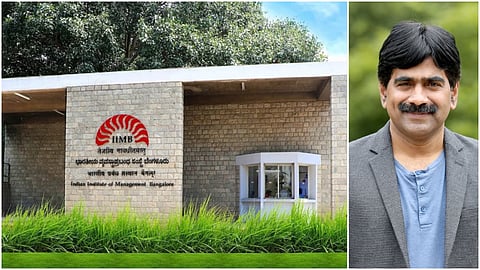

Our location in India's Silicon Valley has allowed us to leverage Bengaluru's technology ecosystem. In 1998, we launched a weekend MBA to support the burgeoning IT sector. Our entrepreneurial ecosystem is a key differentiator; we supported 1,300+ startups last year. The Nadathur S Raghavan Centre for Entrepreneurial Learning (NSRCEL), a top academic incubator, fosters innovation among students, women entrepreneurs and social ventures. Academically, IIMB offers flexibility with a high ratio of electives in the second year. It also focuses on public policy and social impact through the Centre for Public Policy (CPP), which collaborates on policy research. Globally, IIMB consistently ranks among India’s leading B-schools in QS and Financial Times listings and is part of GNAM (Global Network for Advanced Management). Since 2014, we have offered MOOCs on edX, with over 50 courses reaching two million learners. We’ve prioritised inclusivity and accessibility, and this year reached 40% women in the PGP cohort.
We’ve learned that while the job market may have some volatility from year to year, there will always be good opportunities as long as the Indian economy is growing. Our approach is to prepare students to handle this volatility at both the industry and enterprise levels. IIMB’s inventive curriculum places ‘adaptability’ as the key building block in functional management education. Our teaching and learning systems integrate key trends and engage with global phenomena such as AI, digital technology, and ESG (Environmental, Social, and Governance), with the aim of shaping management practice. For instance, students are encouraged to use generative AI tools in their assignments and projects, as this is a skill they will utilise in their professional careers. At the same time, we also emphasise that such tools cannot replace the need for a strong foundation in core subjects, and that human creativity and higher-order decision-making remain essential for meaningful differentiation in business.
A significant part of the learning at IIM Bangalore comes from collaboration with peers, discussions outside the classroom, and participation in projects and competitions organised by corporations. We have adapted our approach following the pandemic, recognising that some foundational topics can be learned online at the student’s convenience, which frees up valuable class time for more challenging and complex discussions. Our startup incubator, NSRCEL, supports students and faculty as well as outside entrepreneurs, and our campus culture encourages a go-getter atmosphere where students are pushed to explore beyond their comfort zones. We’ve created an environment where academic rigor combines with practical exposure, critical thinking, and leadership development. The institute also focuses on developing critical soft skills like resilience, adaptability, and scenario planning — attributes essential for navigating today’s unpredictable business environment.
The Tony James Centre represents a significant milestone in our commitment to advancing India's financial ecosystem. The Centre will serve as a catalytic force in shaping the future of PEVC in India. It is designed as a leading platform for academic research, industry engagement and policy dialogue. We aim to bring together global experts on private equity and venture capital trends. Given India's position as the third-largest startup ecosystem with over 80,000 startups, there is a need for financial expertise and ethical leadership. The Centre will conduct research, offer specialised education programmes and facilitate dialogue between academia, industry and policymakers.
Our disability inclusion framework won the NCPEDP-Mphasis Universal Design Award 2012 for Equal Opportunity Policy, Reasonable Accommodation Procedure and procuring Assistive Technology. We recorded 40% women in this year’s PGP admissions, but gender diversity extends beyond students: 52% of administrative staff are women and women serve on the board. The curriculum includes diversity and the Women in Management club fosters networking. NSRCEL has 87 employees, 52 of whom are women, comprising 59% of staff; 52% of these women occupy senior leadership roles. We also introduced a funded NSR pre-doc programme to bridge disadvantaged students to PhD programmes, with a 70% success rate; the current batch is 83% women.
IIMB was early to realise that an inclusive approach to management education is fundamental to social equity, inclusion and diversity. The 'Pioneering School' title, in turn, validates our long-standing commitment to creating business leaders who understand their broader societal responsibilities. It reflects our integrated approach to embedding social and environmental consciousness in our curriculum. Moreover, it reinforces our mission to nurture transformative change that addresses complex global challenges and benefits the well-being of all our stakeholders.
